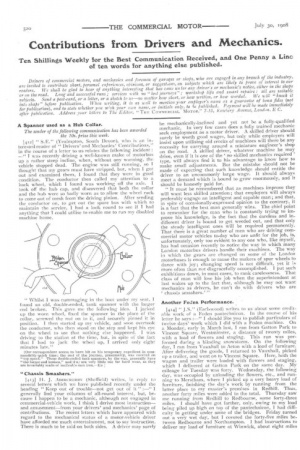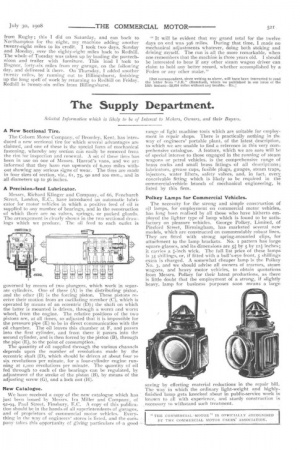Contributions from Drivers and Mechanics.
Page 18

Page 19

If you've noticed an error in this article please click here to report it so we can fix it.
Ten Shillings Weekly for the Best Communication Received, and One Penny a Line of ten words for anything else published.
Drivers of commercial motors, and mechanics and foremen of garages or shops, who are engaged in any branch of the industry, are invited to contribute short, personal experiences, oPinions, or suggest Ions, on subjects which are likely to prove of interest to our
readers. We shalt be glad to hear of anything interesting that has come linter any driver's or mechanic's notice, either in the shops
• or on the road. Long and successful runs ; services with no " lost journeys" ; workshop tips and . smart repairs all are suitable
subjects. Send a post-card, or a letter, or a sketch to us—no matter how short, or how written, or how worded. We will " knock it into shafte" before Publication. When writing, it is as well to mention your employer's name as a guarantee of bona fides (not for publication), and to state whether you w;sh your own name, or initials only, to be published. Payment will be nrade immediately after publication. Address your letters to The Editor, "THE COMMERCIAL Mtn-0R," 7-15, ll'osebery Avenue, London. E C.
A Spanner used as a Hub Collar.
The sender of the following communication has been awarded the 10s, prize this week.
[412] " S. E.'' (Yealmpton, South Devon), who is an terested reader of " Drivers' and Mechanics' Contributions," in the course of a letter to us relates the following incident : —" T was recently driving a well-known make of motorbus up a rather steep incline, when, without any warning, the vehicle stopped dead. The engine was still running, so T thought that my gears must have stripped, but, when I got out and examined them, I found that they were in good condition. The conductor then called my attention to a back wheel, which I found was working off the axle. I took off the hub cap, and discovered that both the collar and the hub were so badly worn as to allow the wheel rack to come out of mesh from the driving pinion. After sending the conductor on, to get out the spare bus with which to maintain the service, I had a look round to see if I had anything that I could utilise to enable me to run my disabled machine home.
" Whilst I was rummaging in the boot under my seat, I found an old, double-ended, tank spanner with the larger end broken. This gave Inc the following idea. I jacked up the worn wheel, fixed the spanner in the place of the collar, screwed the nut on to it, and Securely pinned it in position. I then started up my vehicle, and soon overtook the conductor, who then stood on the step and kept his eye on the wheel to see that nothing else happened. I was driving to the station at the time, hut, in spite of the fact that I had to jack the wheel up, I arrived only eight minutes late."
tour correspondent seems to have hit en his temporary expedient in commendably quick time; the rest of the Jeurney, presumably, was covered on "top speed." These douhle-ended tank spanners, by the way, generally have "the larger end broken," and the; are very little use for hard wear, as they are invariably made of malleab7e cast iron—En "Chassis Smashers."
14 131 II. j. ABERCROMIIV (Sheffield) writes, in reply ti several letters which we have published recently under the heading " Keep out of trouble—not get out of it " :—" I generally find your columns of all-round interest, but, because I happen to be a mechanic, although not engaged in commercial-vehkle work, I think I derive most instruction— and amusement—from your drivers' and mechanics' page of contributions. The recent letters which have appeared with regard to the mechanical status of a motor-vehicle driver have afforded me much entertainment, not to say instruction. There is much to be said on both sides. A driver may surely be mechanically-inclined and yet not be a fully-qualified mechanic. In very few cases does a fully trained mechanic seek employment as a motor driver. A skilled driver should surely be worth good wages, but only while employers will insist upon utilisingold crocks of machines will there be any necessity for carrying around a miniature engineer's shop on the road. A skilled driver, whatever machine he may drive, even if it is one of the no skilled mechanics required ' type, will always find it to his advantage to know how to make small adjustments. But the mistake should not be made of exrcting that such knowledge should entitle the driver to an uncommonly large wage. It should always meet a demand which is bound to grow enormously, and it should be honestly paid for. " It must be remembered that as machines improve they will want less skilled attention; that employers will always preferably engage an intelligent and capable man; and that, in spite of occasionally-expressed opinion to the contrary, it is a fact that the best man generally wins. The chief point to remember for the man who is constantly trying to improve his knowledge, is the fact that the careless and indifferent driver is bound to get weeded out, and that only the steady intelligent ones will be required permanently. That there is a great number of men who are driving commercial motor vehicles to-day who are unfit for the job, is, unfortunately, only too evident to any one who, like myself, has had occasion recently to notice the way in which many London motorbus drivers handle their machines. The way in which the gears are changed on some of the London motorbuses is enough to cause the makers of spur wheels to dance with joy; changing .speed is not difficult, yet it is more often than not disgracefully accomplished. I put such exhibitions clown, in most cases, to rank carelessness. That
class of man will lose his job when the superintendent at last wakes up to the fact that, although he may not want mechanics as drivers, he can't do with drivers who are chassis smashers.' " Another Foden Performance.
14141 " J.S." (Earlswood) writes to us about some creditable work of a Foden pantechnicon. In the course of his letter he says :—" I should like you to publish particulars of twelve days' work which I. did with a :Foden machine. On a Monday, early in March last, I ran from Gatton Park to Vincent Square, Westminster, a distance of twenty miles, with a load of flowers and staging. This run was performed during a blinding snowstorm. On the following day, I ran from Vauxhall to Acton with a load of furniture. After delivering the goods, I returned to Vauxhall, picked up a trailer, and went on to Vincent Square. Here, both the wagon and trailer were loaded with flowers and staging, which I delivered at Gatton Park on the same day. My mileage for Tuesday was forty. Wednesday, the following day, was occupied by unloading the flowers, etc., and running to Merstham, where I picked up a very heavy load of furniture, finishing the day's work by running from the latter place to my master's premises in Redhill. Thus, another forty mites were added to the total. Thursday saw me running from Redhill to Redbourne, some forty-three miles. I should have got farther, only, owing to my load being piled up high on top of the pantechnicon, I had difficulty in getting under some of the bridges. Friday turned out a very wet day, but I covered the forty-five miles between Redbourne and Northampton. I had instructions to deliver my load of furniture at Winwick, about eight miles from Rugby ; this I did on Saturday, and ran back to Northampton for the night, my machine adding another twenty-eight miles to its credit. 1 took two days, Sunday and Monday, over the eighty-eight miles back to Redhill. The whole of Tuesday was taken up by loading the pantechnicon and trailer with furniture. This load I took to Bognor, forty-six miles from my garage, on the following day, and delivered it there. On Thursday, I added another twenty miles, by running out to Billingshurst, finishing up the long spell of work by returning to Redhill on Friday. Redhill is twenty-six miles from Billingshurst.
"It will be evident that my grand total for the twelve (lays on end was 396 miles. During that time, I made no mechanical adjustments whatever, doing both stoking and driving myself, The run is all the more remarkable, when one remembers that the machine is three years old. I should be interested to hear if any other steam wagon driver can claim to hold any better record, whether accomplished by a Foden or any other make."
(our correspondent, since writing an above, will have been interested to read the letter from " J.H." (Hereford), which we published in our issue of the 15th instant-19,254 miles without any troulde.—En.]




















